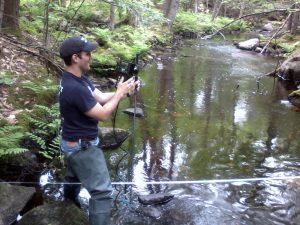Student Spotlight: Brett Gerard
 The Sebago Lake watershed supplies water to 15 percent of Maine’s population, but projections indicate continued development over the next few decades could have a negative effect on water quality.
The Sebago Lake watershed supplies water to 15 percent of Maine’s population, but projections indicate continued development over the next few decades could have a negative effect on water quality.
Brett Gerard, a Ph.D. student in the School of Earth and Climate Sciences, decided to look where early signs of change within the watershed might be detected: below the surface. Working with the Mitchell Center, Gerard’s research examines the characteristics and dynamics of channel beds in the Sebago Lake watershed. The condition of sediment on the channel beds, Gerard explains, is one of the primary factors controlling the exchange of water between the river environment and the groundwater system. The exchange plays an important role in maintaining water quality.
“I am particularly interested in the role of climate and human activities on channel bottom conditions” said Gerard who works on the “Safeguarding a Vulnerable Watershed” project. “I believe it might be an excellent location to detect changes from residential and commercial development. And changes to channel beds and the dynamics of river/groundwater exchange might be an indicator of future degradation in water quality.”
Gerard is still analyzing data from the project and continues his studies working with advisor Sean Smith, Assistant Professor in the School of Earth and Climate Sciences. His research is currently funded by the Mitchell Center’s Water Resources Research Institute (WRRI) grant program.
Gerard considers his experience with the Mitchell Center especially valuable because the center brings together scientists and researchers from the social sciences, biophysical sciences, environmental science, economics and many other disciplines.
“The program really strives to bring together researchers from all disciplines to work on problems together. This breeds a completely different energy and really opens perspectives from the more narrow focus of our home departments,”
Gerard said.
